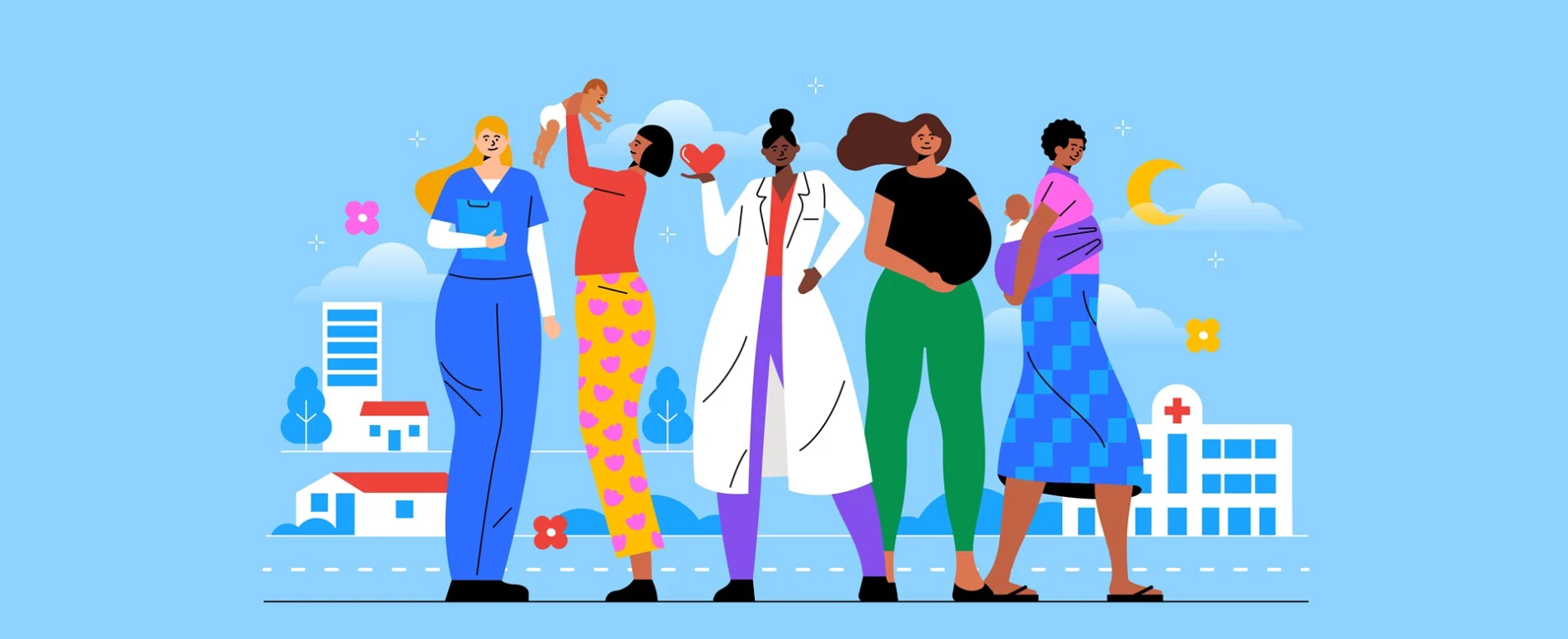PURPOSE: The World Health Day is celebrated annually and each year on 7 April to mark the anniversary of the founding of WHO in 1948 and to draw attention on health issues concerning people all over the world. World Health Day is a global campaign, inviting everyone – from global leaders to the public in all countries – to focus on a single health challenge with global impact. By focusing on new and emerging health issues, World Health Day provides an opportunity to start collective action to protect people's health and well-being. The future of health depends on how well we power health through science, research, innovation, data, digital technologies, and partnerships.
FORUM: “Healthy beginnings, hopeful futures.“ World health Day 2025. Join the #OneWorldMovement and support WHO’s work to protect mothers and babies around the world.
Helping every woman and baby survive and thrive: This task is critical. Tragically, based on currently published estimates, close to 300 000 women lose their life due to pregnancy or childbirth each year, while over 2 million babies die in their first month of life and around 2 million more are stillborn. That’s roughly 1 preventable death every 7 seconds. Based on current trends, a staggering 4 out of 5 countries are off track to meet targets for improving maternal survival by 2030. 1 in 3 will fail to meet targets for reducing newborn deaths.
Listening to women and supporting their families: Women and families everywhere need high quality care that supports them physically and emotionally, before, during and after birth. Health systems must evolve to manage the many health issues that impact maternal and newborn health. These not only include direct obstetric complications but also mental health conditions, noncommunicable diseases and family planning. Additionally, women and families should be supported by laws and policies that safeguard their health and rights.
The WHO Council on the Economics of Health for All has found that at least 140 countries recognize health as a human right in their constitution. Yet countries are not passing and putting into practice laws to ensure their populations are entitled to access health services. This underpins the fact that at least 4.5 billion people — more than half of the world’s population — were not fully covered by essential health services in 2021. You are invited to share your lived experiences; share your own experiences or stories of pregnancy and birth and thank those who provide quality care. To discuss and address these types of challenges. Follow the conversations with the hashtags: #HopefulFutures, #WorldHealthDay, #7april, #HealthforAll.
EVENTS: On April 7th, for the World Health Day 2025, the World Health Organization will observe its anniversary by launching a year-long campaign on maternal and newborn health. The campaign, titled Healthy beginnings, hopeful futures, will urge governments and the health community to ramp up efforts to end preventable maternal and newborn deaths, and to prioritize women’s longer-term health and well-being.Helping every woman and baby survive and thrive; The goals of the observance are to raise awareness about gaps in maternal and newborn survival and the need to prioritize women’s longer-term well-being; to advocate for effective investments that improve the health of women and babies; to encourage collective action to support parents as well as health professionals who provide critical care; to provide useful health information relating to pregnancy, childbirth, and the postnatal period. The World Health Organization (WHO) and its partners will also share useful information to support healthy pregnancies and births, and better postnatal health.To attend our global events to learn more about what it will take to end maternal and newborn mortality.
On 07 April 2025, from 18:15 – 19:30 UTC Time; at Conference Room 1 at the UN Secretariat in New York City, United States of America. The World Health Day side event entitled “Healthy beginnings, hopeful futures: SDG3 and the constellation of care.” at CPD58 will be held. Learn more
On Monday, April 7th, 2025 from 07:30–08:45 EDT | 11:30–12:45 GMT | 13:30–14:45 CEST | 17:00–18:15 pm IST a hybrid event (in-person and livestream) titled “Healthy beginnings, hopeful futures.“ was held. If you Choose to participate by filling the In-person registration form. Stay tuned to Watch the webcast.
As countries around the world mark World Health Day on 7 April 2025, this high-level advocacy event will spotlight progress and challenges in maternal and newborn health, explore new data and its implications, and highlight opportunities to improve survival. There will be a particular focus on country actions in order to protect the health of women and newborns, including the role of the Every Woman Every Newborn Everywhere (EWENE) initiative in driving country-level progress. Join global health leaders, policy makers, advocates and frontline health-care providers to explore how we can ensure every woman and every newborn has the opportunity for a healthy beginning and a hopeful future. The event aims to highlight global progress in maternal and newborn health and the work of countries leading acceleration efforts; To showcase the value of partnerships in action and advocacy; To advocate for increased funding and political commitment to improve healthcare for women and newborns; and to promote gender equity and health rights for those most at risk.
In the first part participants will hear the opening remarks from UN leaders; Following by panel discussion featuring representatives from trailblazing governments, civil society, mums and midwives. In the second part; A cross-discussion will be held to focus on collaborative action for maternal and newborn health.
The Speakers of the event are Dr Tedros Adhanom Ghebreyesus, Director-General, WHO; Catherine Russell, Executive Director, UNICEF; Dr Natalia Kanem, Executive Director, UNFPA; Neema Rusibamayila Kimambo, WHO Representative in Malawi; Queen Dube, Medical Officer, Maternal, Newborn, Child and Adolescent Health and Ageing Department, WHO headquarters; Tasmin Bota, Founder and Executive Director, Preemie Connect (South Africa); Dr Bibek Kumar Lal, Director, Family Welfare Division, Department of Health Services, Ministry of Health and Population, Nepal; Dr Aparajita Gogoi, Executive Director, Centre for Catalyzing Change (India) and Co-Chair, White Ribbon Alliance Global; Professor Caroline Homer, Director of the ARPAN Centre for Research Excellence at the Burnet Institute, on behalf of the Western Pacific Regional Office of ISA and the Australian Stillbirth Centre of Research Excellence; Dr Angel Mwiche, Assistant Director Reproductive and Maternal Health, Ministry of Health, Zambia; Rachel Ndirangu, Regional Director (Africa), Advocacy and Public Policy, PATH and Mr. Femi Oke, the Moderator.
MESSAGES: Explore this year’s Key messages!
“We can end preventable maternal and newborn deaths.” The WHO is calling for a worldwide reinvigoration of efforts to ensure access to high quality care for women and babies, especially in the poorest countries, humanitarian emergencies and fragile settings where most maternal and newborn deaths occur.
“Beyond survival, critical investment is needed to improve women’s longer-term health and well-being.” Women everywhere need access to health providers who listen to their concerns and meet their needs – including in the months after pregnancy when millions lack critical support, despite enduring lasting health consequences after birth.
“Better maternal health means improving the rights of women and girls.” Better maternal health means improving the rights of women and girls so that they can plan their lives and protect their health. Their agency and empowerment are fundamental for tackling both maternal and newborn deaths and achieving health for all.
STATEMENTS: Read the Statement of the WHO Director-General the World Health Day 2025, April 7th, the Statement of the PAHO Director on World Health Day 2025, April 7th, the Statement of the WHO African Regional office Director on World Health Day 2025, April 7th, the Statement of the WHO WPRO Regional office Director on World Health Day 2025, April 7th, the Statement of the WHO SEARO Regional office Director on World Health Day 2025, April 7th, the Statement of the WHO Europe Regional office Director on World Health Day 2025, April 7th, the Statement of the WHO EMRO Regional office Director on World Health Day 2025, April 7th.
PODCASTS: WHO is calling for a worldwide reinvigoration of efforts to ensure access to high quality care for women and babies. Women everywhere need access to health providers who listen to their concerns and meet their needs, so that they can plan their lives and protect their health. The WHO internal review showed that world and regional observances can be powerful tools to raise awareness of priority public health issues, and that the overall communications approach of the Secretariat enables the Organization to reach all key target audiences and constituencies with evidence-based public health messages. Listen to the audio-podcasts!
CAMPAIGN MATERIALS: Alongside advocating for actions that improve survival, in this year-long campaign on maternal and newborn health, WHO and partners will work with mothers and health-care professionals to share useful information about healthy pregnancies, births, and postnatal health. The health of mothers and babies is the foundation of healthy families and communities, helping ensure hopeful futures for us all. Participate to the Campaign. Explore the World Health Day 2025 Campaign assets and the communication toolkit. Get the communication materials!
ACTIONS FOR GOVERNMENTS
Every law counts; every ministry can and should legislate to realise the right to health across the full range of sectors:
Finance: tax tobacco, sugar, and alcohol.
Agriculture: eliminate trans fats; reduce amount of antimicrobials in the agri-food system by 30-50% by 2030.
Environment: stop fossil fuel subsidies and subsidize or exempt tax of clean energy and fuels such as solar-, hydro- and wind-based electricity.
Justice: prohibit all forms of discrimination.
Transport: build up cycling infrastructure, support pedestrianization.
Labour: Ensure decent work, worker rights and protections, and create fair, equal and gender-responsive working conditions for health and care workers.
Social affairs / social development: Ensure access to social protection (e.g. health-care protection, pensions, unemployment benefits) to reduce households’ vulnerability to poverty and counteract the negative impacts of unexpected life events on income, wealth or health.
Invest in health like your bottom line depends on it: an additional USUSUSUS$ 200–328 billionnbsp;200–328 billion ;200–328 billionnbsp;200–328 billion a year is needed globally to scale up primary health care in low- and middle-income countries (i.e. 3.3% of national forecast GDP).
Deliver on the right to health: make health services available, accessible, acceptable and of good quality for everyone, everywhere.
Be strategic and build from the basics: reorient health systems around primary health care.
Champion transparency and accountability: tackle corruption by strengthening governance and working across sectors.
Involve the general public in health decision-making: ‘social participation’ happens when individuals and communities are meaningfully involved in decision-making around health, e.g. town-hall meetings and citizen assemblies, focus groups and consultations, health councils, representation on steering groups and review boards.
Know the health needs of populations and act on them: collect, analyze, use and monitor data, disaggregate by age, sex, economic status, education level, place of residence, race and ethnicity, and other characteristics and act to correct health inequities.
Safeguard the right to health in war and conflict: protect health infrastructure and health workers and ensure uninterrupted access to health services, in adherence to international humanitarian and human rights law.
PARTNERSHIPS: The new partners who asked to participate in a partnership with the World Health Organization, need to complete the following criteria to review such requests:
The partnership demonstrates a clear added value for public health.
The partnership has a clear goal that concerns a priority area of work for WHO.
Partnerships are guided by the technical norms and standards established by WHO.
The partnership supports national development objectives.
The partnership ensures appropriate and adequate participation of stakeholders.
The roles of partners are clear.
Transaction costs, potential benefits and risks related to a partnership are evaluated.
Pursuit of the public-health goal takes precedence over the special interests of participants.
The partnership has an independent external evaluation and/or self-monitoring mechanism.
ACTIONS FOR INDIVIDUALS
Know your health rights. You have the right to:
safe and quality care, without any discrimination.
privacy and confidentiality of your health information.
information about your treatment and to informed consent.
bodily autonomy and integrity.
Make decisions about your own health.
Protect your right to health as a basic human right.
Everyone should have access to the health services they need when and where they need them, without facing financial hardship. So, if you cannot access healthcare, that’s not right. Here are some ways to take action:Advocate – appeal to political leaders, join health communities demanding action, participate in petitions and discussions.
Organize your community – e.g. at work, church – to agree what needs to change and how.
Promote the right to health as an intrinsic pillar of our broader human rights.
Respecting our right to health means respecting our rights to access safe drinking water, clean air, good nutrition, quality housing, decent working conditions, and freedom from violence and discrimination.
Champion health as a priority.
Get involved with decision-making around health. Examples of how to participate include: town-hall meetings and citizen assemblies, focus groups and consultations, health councils, steering groups and review boards.
WHY WE CELEBRATE THE DAY?
Every year, World Health Day is celebrated on April 7th to mark the anniversary of the founding of WHO in 1948. Each year a theme is selected for World Health Day that highlights a priority area of concern for WHO. The following is a list of suggested activities to disseminate health messages during the World Health Day campaign.
Hold health conferences and fairs and fun runs.
Develop educational materials containing health messages.
Give technical presentations to experts and champions.
Obtain endorsements and enlist the participation of athletes, celebrities and government officials in events.
Develop public service announcements and news releases.
Hold assemblies, conferences, workshops and symposia.
Encourage class or study group discussions.
Assign student assignments (essays, research and book reports).
Create games and contests (posters, writing, photography, essays, exercise and art).
Distribute information from health departments and co-sponsors.
Invite guest speakers to events.
Create plays, music, films and audiovisual presentations.
Conduct diagnostic screenings.
HOW TO GET INVOVED!
It’s time to motivate action to tackle the health challenges of today and tomorrow. In addition, you may consider:
Engage members of parliament, government officials and the media to promote health messages and highlight risk factors causing hypertension
Present the commemorative postage stamps bearing the World Health Day slogan
Organize special lectures and discussions in health forums and syndicates.
Display the communication materials for their placement in waiting rooms in public places, including hospitals and clinics to raise awareness.
Encourage non-governmental organizations to participate in events.
Ask religious leaders in mosques and churches to devote sermons during the first week of April.
Encourage national and local media outlets to promote the World Health Day campaign.
Advocate with the Ministry of Education to allocate at least one hour a day in all primary, preparatory and secondary schools, and medical schools in particular, during the week of World Health Day to talk about Health issues.
ORGANIZERS
The term "partnerships" is used generically to include various organizational structures, relationships and arrangements within and external to WHO for furthering collaboration in order to achieve better health outcomes. The World Health Day is organized by WHO Regional Offices, WHO headquarters; The WHO African Region; The WHO Region of the Americas; The WHO South-East Asia Region; The WHO European Region; The WHO Western Pacific Region; and the U.N. Information Centre. With the partnership of the Alliance for Health Policy and System Research (AHPSR); The European Observatory on Health Systems and Policies; The Partnership for Maternal, Newborn and Child Health (PMNCH); The Unitaid. With the collaboration of the Joint United Nations Programme on HIV/AIDS (UNAIDS); The United Nations International Computing Centre (UNICC); the WHO Framework Convention on Tobacco Control (FCTC); The Special Programme on Research and Training in Tropical Diseases (TDR); The Special Programme of Research, Development and Research Training in Human Reproduction (HRP); the Global Polio Eradication Initiative (GPEI); The Global Alliance for HIV, Tuberculosis and Malaria; The Gavi alliance.
With the Participation of the International and Regional Community Health Organizations, hospitals, clinics, dispensaries, healthcare centers, with the assistance of practicians and surgeons, nurses, healthworkers, academics and individuals.
Make a donation
Contribute to the WHO Foundation which supports WHO’s work to protect mothers and babies in countries around the world. The WHO review showed that the success of campaigns depends on a number of additional factors, including: relevance of the subject and prioritization of the subject and the campaign by countries; agreement by key stakeholders on clear goals and objectives; having effective planning and project management mechanisms in place; and sufficient financial and human resources being allocated to campaign planning, management and evaluation.










